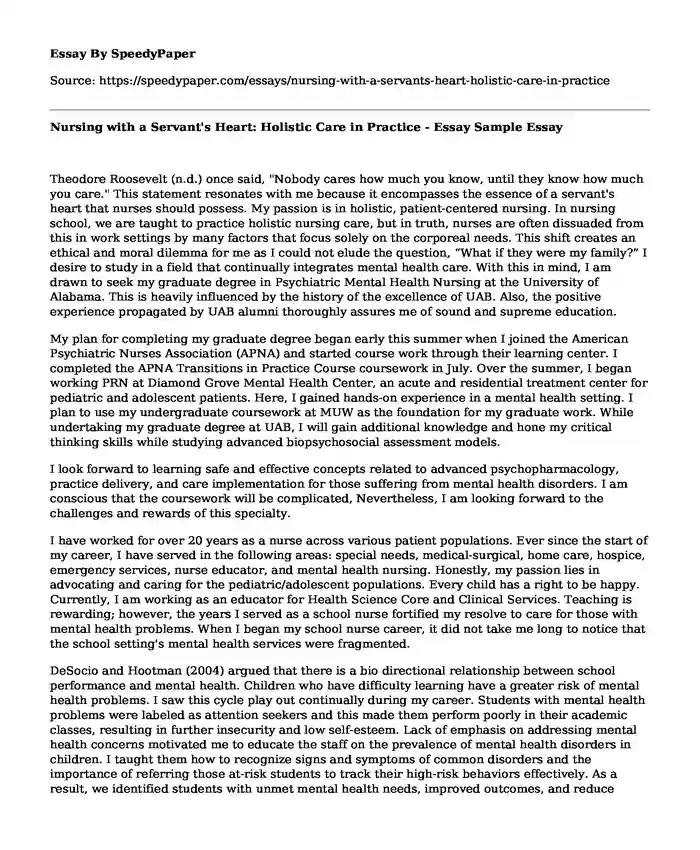Theodore Roosevelt (n.d.) once said, "Nobody cares how much you know, until they know how much you care." This statement resonates with me because it encompasses the essence of a servant's heart that nurses should possess. My passion is in holistic, patient-centered nursing. In nursing school, we are taught to practice holistic nursing care, but in truth, nurses are often dissuaded from this in work settings by many factors that focus solely on the corporeal needs. This shift creates an ethical and moral dilemma for me as I could not elude the question, “What if they were my family?” I desire to study in a field that continually integrates mental health care. With this in mind, I am drawn to seek my graduate degree in Psychiatric Mental Health Nursing at the University of Alabama. This is heavily influenced by the history of the excellence of UAB. Also, the positive experience propagated by UAB alumni thoroughly assures me of sound and supreme education.
My plan for completing my graduate degree began early this summer when I joined the American Psychiatric Nurses Association (APNA) and started course work through their learning center. I completed the APNA Transitions in Practice Course coursework in July. Over the summer, I began working PRN at Diamond Grove Mental Health Center, an acute and residential treatment center for pediatric and adolescent patients. Here, I gained hands-on experience in a mental health setting. I plan to use my undergraduate coursework at MUW as the foundation for my graduate work. While undertaking my graduate degree at UAB, I will gain additional knowledge and hone my critical thinking skills while studying advanced biopsychosocial assessment models.
I look forward to learning safe and effective concepts related to advanced psychopharmacology, practice delivery, and care implementation for those suffering from mental health disorders. I am conscious that the coursework will be complicated, Nevertheless, I am looking forward to the challenges and rewards of this specialty.
I have worked for over 20 years as a nurse across various patient populations. Ever since the start of my career, I have served in the following areas: special needs, medical-surgical, home care, hospice, emergency services, nurse educator, and mental health nursing. Honestly, my passion lies in advocating and caring for the pediatric/adolescent populations. Every child has a right to be happy. Currently, I am working as an educator for Health Science Core and Clinical Services. Teaching is rewarding; however, the years I served as a school nurse fortified my resolve to care for those with mental health problems. When I began my school nurse career, it did not take me long to notice that the school setting's mental health services were fragmented.
DeSocio and Hootman (2004) argued that there is a bio directional relationship between school performance and mental health. Children who have difficulty learning have a greater risk of mental health problems. I saw this cycle play out continually during my career. Students with mental health problems were labeled as attention seekers and this made them perform poorly in their academic classes, resulting in further insecurity and low self-esteem. Lack of emphasis on addressing mental health concerns motivated me to educate the staff on the prevalence of mental health disorders in children. I taught them how to recognize signs and symptoms of common disorders and the importance of referring those at-risk students to track their high-risk behaviors effectively. As a result, we identified students with unmet mental health needs, improved outcomes, and reduce negative consequences. We included community outreach mental health services providers and, in doing so, secured resources for teaching and consultation. This fostered communication with parents and staff and allowed us to address follow-up needs and recommendations. Slowly but surely, the culture in the school changed.
Upon graduation, I plan to utilize my new knowledge and clinical experience to safely and effectively treat and advocate for those with psychiatric and mental health disorders and to empower patients and their families with the tools to break down the barriers they are facing. My future goal is to work with the APNA and National School Nurse Association to discuss the importance of adding mental health screenings as part of their yearly mandatory health screenings. Implementing this measure could be the first step towards piecing together the fragments of school-based mental health services. An additional goal is to work in the community health care setting in Mobile County and eventually serve in an acute care mental health day treatment program for adolescent or pediatric patients. The University of Alabama at Birmingham will be the perfect arena for me to begin my steps toward accomplishing these goals.
References
DeSocio, J., & Hootman, J. (2004). Children’s mental health and school success. The Journal of School Nursing, 20(4), 189-196. https://doi.org/10.1177/10598405040200040201.
Roosevelt, T. (2004). The Rough Riders: An Autobiography (Vol. 153). Library of America. https://www.theodorerooseveltcenter.org/Search?r=1&searchTerms=%E2%80%9CNobody%20cares%20how%20much%20you%20know,%20until%20they%20know%20how%20much%20you%20care.
Cite this page
Nursing with a Servant's Heart: Holistic Care in Practice - Essay Sample. (2023, Nov 25). Retrieved from https://speedypaper.com/essays/nursing-with-a-servants-heart-holistic-care-in-practice
Request Removal
If you are the original author of this essay and no longer wish to have it published on the SpeedyPaper website, please click below to request its removal:
- The Man Flu Essay Samples
- Essay Sample on Solutions to Environmental Issues in Memphis, Tennessee
- Essay Sample on Smartphone Addiction Among Adolescents
- Coronavirus vs Capitalism. Essay Example
- Gut Microbiota: Dominated by Firmicutes and Bacteroidetes - Essay Sample
- Navigating the Pandemic: Assessing San Diego's COVID-19 Incident Action Plan and Its Feasibility - Free Paper
- Various Protein Diets - Free Paper Sample
Popular categories





